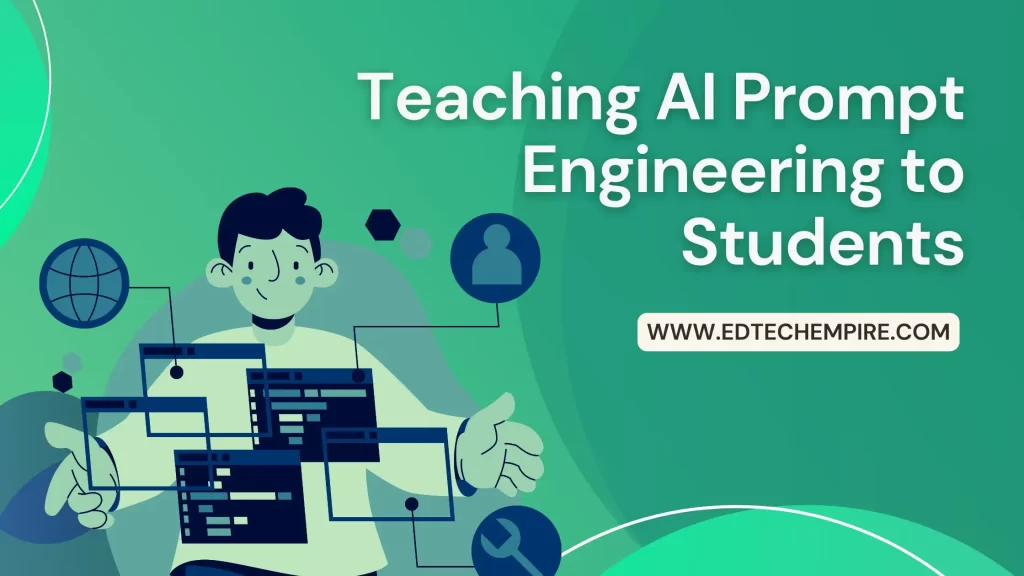![]()
Listen up, folks! Let’s talk about the big brain behind all our tech: Artificial Intelligence (AI). It’s the secret sauce that powers self-driving cars, predicts our shopping preferences, and even tells us what to watch next on Netflix. But let’s be real, AI can’t do all this magic on its own. It needs data and clear instructions, just like a toddler needs a nap and a snack. Enter prompt engineering, the Jedi mind trick that trains AI to be accurate, ethical, and effective. Without prompt engineering, we risk unleashing a horde of rogue robots that think a toaster is a hat, and nobody wants that. There comes the importance of teaching AI prompt Engineering to Students.
So, let’s make sure our future generations of AI algorithms are taught proper manners, shall we? In this article, we’ll delve into the world of prompt engineering, showing you how to craft the perfect AI prompt. We’ll also explore why prompt engineering is so darn important, and give you some tips on how to teach it to the next gen of tech wizards. And hey, who knows, maybe you’ll be inspired to become the next prompt engineering guru!
What is prompt engineering in AI?
Prompt engineering is the art of creating top-notch instructions for AI algorithms to follow. A prompt basically tells an AI what it needs to do to accomplish a specific task. And here’s the kicker: the quality of that prompt has a huge impact on the accuracy, effectiveness, and ethical implications of the AI algorithm. So, if you want your AI to be unbiased, accurate, and ethical, you’ve gotta nail that prompt design.
Because here’s the thing: a poorly designed prompt can lead to all sorts of AI hiccups. You might end up with biased algorithms that discriminate against certain groups or inaccurate results that mess up your data. And let’s not forget the ethical implications of AI – a bad prompt can lead to some seriously questionable outcomes.
That’s why prompt engineering is such a crucial part of AI development. We need to make sure that the prompts we create are accurate, unbiased, and ethical, so that we can trust our AI to make the right decisions. It’s like building a solid foundation for a house – without it, everything else falls apart.
How do you write an AI prompt?
When it comes to writing an AI prompt, you gotta know your stuff. You need a deep understanding of the task at hand, or else you might end up with an AI that’s about as useful as a screen door on a submarine. So, let’s break down the steps involved in crafting a killer AI prompt:
- Define the task. Be crystal clear about what you want your AI to do. This will help you create a prompt that’s laser-focused on the task at hand.
- Identify the data. You gotta choose the right data to train your AI on, or else it’ll be like trying to teach a dog to meow. Make sure the data and prompt are aligned.
- Choose the language. You can’t just use any old language for your prompt. You need to pick the one that’s best suited for the task and the data you’re working with.
- Write the prompt. This is where you put it all together. Make sure your prompt is clear, concise, and easy for the AI to understand. You don’t want your AI scratching its head and looking at you like a dog trying to understand calculus.
- Test the prompt. Once you’ve written your prompt, put it to the test. Make sure it produces accurate, ethical, and effective results. If it doesn’t, it’s back to the drawing board.
Remember, crafting an effective AI prompt takes time and effort. But if you follow these steps, you’ll be well on your way to creating an AI that’s smarter than your average bear.
Importance of prompt engineering
Prompt engineering is essential for ensuring that AI algorithms are accurate, ethical, and effective. Here are some reasons why prompt engineering is important:
- Accuracy: High-quality prompts lead to accurate AI algorithms. This is essential for tasks such as medical diagnosis, where accuracy can mean the difference between life and death.
- Ethics: Prompt engineering can help to ensure that AI algorithms are ethical. This is essential for tasks such as hiring and lending decisions, where bias can lead to discrimination.
- Effectiveness: High-quality prompts can improve the effectiveness of AI algorithms. This is essential for tasks such as language translation, where effectiveness can impact communication and understanding.
Tips for Teaching AI Prompt Engineering
Teaching AI prompt engineering to students can be challenging, but it is essential for preparing future generations for the future of technology. It is also an essential consideration for teaching in the age of ChatGPT and other AI tools. Here are some tips for teaching AI prompt engineering:
- Start with the basics: Begin by teaching the basics of AI and machine learning. This will help students to understand the context of prompt engineering.
- Emphasize the importance: Emphasize the importance of prompt engineering and its impact on accuracy, ethics, and effectiveness.
- Use examples: Use real-world examples to illustrate the importance of prompt engineering and its impact on AI algorithms.
- Practice: Provide opportunities for students to practice writing prompts and testing them for accuracy, ethics, and effectiveness.
Prospects of AI Prompt Engineering
The prospects of AI prompt engineering are exciting. As AI continues to evolve and become more sophisticated, prompt engineering will play an increasingly important role in the development of AI algorithms. Here are some prospects of AI prompt engineering:
- Advancements in AI technology: As AI technology advances, prompt engineering will become more complex and sophisticated. This will require new techniques and tools for prompt engineering.
- Increased demand for ethical AI: The demand for ethical AI is growing, and prompt engineering will play a crucial role in ensuring that AI algorithms are ethical and unbiased.
- New applications for AI: As new applications for AI emerge, prompt engineering will be necessary to develop prompts for these applications.
- Job opportunities: With the increasing demand for AI experts, there will be new job opportunities in the field of prompt engineering.
- Improved accuracy and effectiveness: As prompt engineering techniques improve, AI algorithms will become more accurate and effective in performing tasks.
FAQs:
Q: What are some common challenges in prompt engineering?
A: There are a few hurdles that prompt engineers need to jump over. For starters, natural language is full of nuance and subtlety, so it can be tough to get your AI to understand what you want it to do. Choosing the right vocabulary is also key – use the wrong words and you might end up with an AI that’s about as helpful as a chocolate teapot. And finally, you need to structure your prompts in a way that makes sense to the AI system. That means clear and concise instructions that are easy for the AI to follow.
Q: Why is prompt engineering important?
A: In a nutshell, prompt engineering is the foundation upon which AI systems are built. A well-crafted prompt ensures that the AI system produces accurate and reliable results. Plus, prompt engineering is also crucial for making sense of the AI’s decision-making process – without a clear prompt, it can be tough to know why the AI is doing what it’s doing.
Q: Can prompt engineering address the issue of bias in AI systems?
A: Absolutely. Bias in AI systems is a major concern, but by creating ethical prompts, we can ensure that the AI produces results that are fair and just. It’s not a silver bullet, but it’s a step in the right direction. And let’s face it – the last thing we need is an AI that’s biased against certain groups of people. That’s just not cool.
Conclusion
Teaching AI prompt engineering to students is essential for preparing future generations for the future of technology. Prompt engineering plays a crucial role in ensuring that AI algorithms are accurate, ethical, and effective. By teaching students the importance of prompt engineering, providing opportunities for practice, and emphasizing its prospects, we can prepare them for a future where AI is an integral part of daily life. As AI continues to evolve, prompt engineering will become increasingly important, and those with expertise in this field will be in high demand.
If you liked this article, we encourage you to also have a look at our article archive on AI in Education.




great put up, very informative. I’m wondering why the opposite specialists of this
sector do not understand this. You should continue your writing.
I’m confident, you have a great readers’ base already!
Hi Braten! Many thanks for your feedback and encouragement! This means a lot!